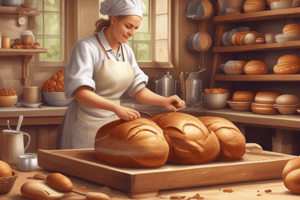Podcast
Questions and Answers
What is the primary role of water in the formation of gluten in bread dough?
What is the primary role of water in the formation of gluten in bread dough?
Water is necessary for gluten formation.
What are the three main functions of water as a solvent and dispersing agent in bread dough?
What are the three main functions of water as a solvent and dispersing agent in bread dough?
Water serves as a solvent and dispersing agent for salt, sugar, and yeast.
How does the temperature of water affect the dough in bread baking?
How does the temperature of water affect the dough in bread baking?
The temperature of water can be varied to obtain dough of the correct temperature.
What is the ideal level of water hardness for bread baking, and why?
What is the ideal level of water hardness for bread baking, and why?
What happens to the gluten and fermentation rate if water is excessively hard?
What happens to the gluten and fermentation rate if water is excessively hard?
What is the consequence of using excessively soft water in bread baking?
What is the consequence of using excessively soft water in bread baking?
Why is it important to use non-chlorinated water when creating a sourdough or levain culture?
Why is it important to use non-chlorinated water when creating a sourdough or levain culture?
How can chlorine be removed from water for use in creating a sourdough or levain culture?
How can chlorine be removed from water for use in creating a sourdough or levain culture?
Flashcards are hidden until you start studying
Study Notes
Water's Importance in Bread Dough
- Water is crucial for gluten formation in bread dough.
- It acts as a solvent and dispersing agent for salt, sugar, and yeast.
- Water is necessary for yeast fermentation and reproduction, with softer doughs fermenting more quickly.
Water's Impact on Dough Consistency
- Water determines the consistency of bread dough.
- The temperature of water can be varied to achieve the correct dough temperature.
Water Hardness and its Effects
- Water hardness is measured in parts per million (ppm) of calcium and magnesium ions.
- Soft water has < 50 ppm, while hard water has > 200 ppm.
- Water with medium hardness (100-150 ppm) is ideal for bread baking, providing nutrients for yeast and benefiting fermentation.
- Excessively hard water (> 200 ppm) can tighten gluten and decrease fermentation rate.
- Excessively soft water (< 50 ppm) can result in sticky, slack dough.
Considerations for Sourdough or Levain Culture
- Highly chlorinated water can negatively impact sourdough or levain cultures by inhibiting microorganism metabolism.
- Leaving water uncovered overnight can dissipate most chlorine, making it suitable for use.
- Alternatively, filtered water can be used.
Water Acidity and its Effects
- Water acidity is measured by pH (potential hydrogen).
- Hard water is generally more alkaline, decreasing yeast activity.
- Water with a slightly acidic pH (< 7) is preferred for bread baking.
Studying That Suits You
Use AI to generate personalized quizzes and flashcards to suit your learning preferences.




